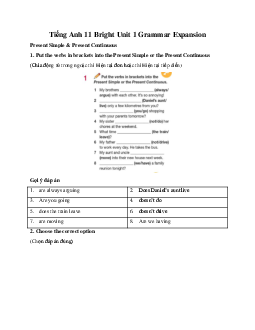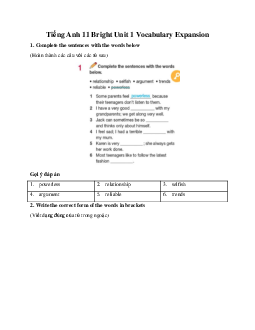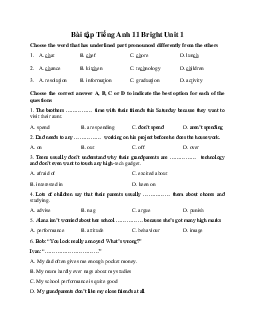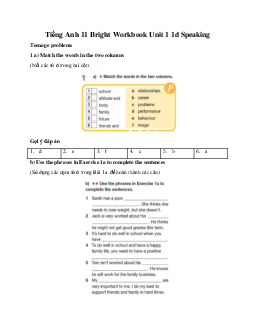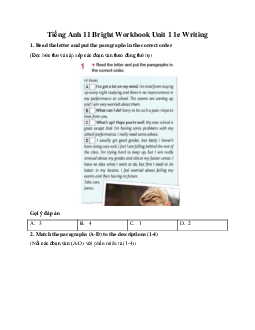




Preview text:
Tiếng Anh 11 Bright Unit 1 1e Writing
An informal letter describing a problem
(Một lá thư thân mật mô tả một vấn đề)
1a) Read the letter. What is about?
(Đọc lá thư. Nó về cái gì?) Gợi ý đáp án
The letter is about a girl called Melissa, who is having a problem with her parents at
home. She writes a letter to her friend to describe her problem and ask for some advice.
b) Read the letter again and match the paragraphs (A-D) to the description (1-4).
(Đọc lại bức thư và nối các đoạn văn (A-D) với phần mô tả (1-4).) Gợi ý đáp án 1. D 2. A 3. B 4. C
Hướng dẫn dịch bài đọc Xin chào Miranda,
A. Mọi thứ thế nào? Mong là mọi việc đều ổn. Mọi thứ ở trường đều tuyệt vời ngoại trừ
việc tôi gặp vấn đề với bố mẹ ở nhà. Tôi thực sự cần vài lời khuyên.
B. Hầu hết thời gian chúng tôi rất hợp nhau và tôi thích dành thời gian cho họ. Vấn đề là
khi tôi muốn đi chơi với bạn bè. Bố mẹ tôi rất nghiêm khắc và đặt ra những quy tắc khắt
khe. Họ muốn tôi về nhà sớm. Đôi khi, tôi không thể đi ra ngoài! Tôi không nghĩ họ thích bạn bè của tôi.
C. Tôi buồn quá! Tôi luôn giúp việc nhà và tôi không bao giờ phạm các quy tắc. Điều đó
thực sự làm tổn thương cảm xúc của tôi khi họ không tin tưởng tôi khi tôi rất có trách
nhiệm. Họ không hiểu bạn bè quan trọng với tôi như thế nào.
D. Bạn nghĩ tôi nên làm gì? Xin lỗi vì đã buồn như vậy. Rất mong nghe ý kiến từ bạn. Sớm hồi âm. Melissa
2. Read the letter again and find examples of informal style in Exercise 1.
(Đọc lại bức thư và tìm các ví dụ về phong cách trang trọng trong Bài tập 1.) Gợi ý đáp án
When writing friendly letters, we use informal style.
- everyday vocabulary and omission of pronouns
e.g. Hope to hear from you soon.
- colloquial expressions and idioms e.g. I owe you one. - informal phrasal verbs
e.g. I get on well with most of my classmates. - short verb forms e.g. I'm, I can't, I don't.
3. Replace the words/phrases in bold in the letter below with the ones in the list.
(Thay thế các từ/cụm từ in đậm trong bức thư dưới đây bằng những từ/cụm từ trong danh sách.) Gợi ý đáp án 1. So happy to hear from you 2. I’m sorry 3. ’m busy as a bee 4. get together 5. chat 6. let me know
4. Imagine you have a problem with your parents or family members. Answer the questions.
(Hãy tưởng tượng bạn có vấn đề với cha mẹ hoặc các thành viên trong gia đình. Trả lời các câu hỏi.) Gợi ý đáp án
1. I’m having problems with my grandparents at home.
2. They are always worried for me and keep telling me what to do. 3. I’m getting tired of it.
5. Write a letter to your English friend about the problem.
(Viết một lá thư cho người bạn ở nước Anh của bạn về vấn đề này.) Gợi ý đáp án Hi Kahyn,
How are things? Hope you are doing well. Everything is quite good but I have some
problems with my marks in class. I really need some advice.
Most of the time I’m swamped with homework and watching online lessons. The
problem is when I take a test in class. I can’t get high marks even though I make an effort
to learn hard. My parents don’t recognize my effort, they shout at me many times.
I'm so depressed! I always try my best to learn and do many exercises to practice. It really
hurts my feelings that my parents don't believe in me.
What do you think I should do? Sorry to be so down. Can't wait to hear from you. Write back soon. Sheila
6. Check your letter for spelling/grammar mistakes. Then, in pairs, swap your
letters and check each other’s work.
(Kiểm tra lỗi chính tả/ngữ pháp trong thư của bạn. Sau đó, theo cặp, trao đổi các bức thư
và kiểm tra bài làm của nhau.)
